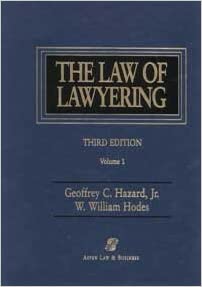The RESTATEMENT is as good as any other source. Here is what § 1(1) says:
“Agency is the fiduciary relationship which results from the manifestation of consent by one person to another that the other shall act on his behalf and subject to his control and consent by the other so to act.”
Notice that agency is in general a voluntary relationship. It is to be conceived in fundamentally dyadic ways. The agent acts on behalf of the principal. And the principal has the right to control the conduct of the agent. In fact, the law of many states, including Texas, is that a principal has the right to control the details of an agent’s activities. See State Farm Mut. Auto. Ins. Co. v. Traver, 980 S.W.2d 625, 627 (Tex. 1998).
There is a school of thought and a strand of the law, which creates a division of labor between clients and lawyers. It has been variously described as “ends-means,” substance-procedure, strategy-tactics, or objective-means[,]” Wolfram at 156, with the client in control of what comes before the hyphens and the lawyer in control of what comes after the hyphens. TxDR 1.02(a)(1) provides that “a lawyer shall abide by a clients decision . . . concerning the objectives and general methods of representation[.] Cmt. #1 for this rule states the following: “The lawyer should assume responsibility for the means by which the client’s objectives are best achieved thus, a lawyer has very broad discretion to determine technical and legal tactics, subject to the client’s wishes regarding such matters as the expense to be incurred and concern for third-persons who might be adversely affected.” Similarly, Hazard and Hodes comment on these matters in their commentary, THE LAW OF LAWYERING.
Some Central Rules (etc.) of the Law of Agency: Duties of Agents. The most central of all is this one: Agents are always bound by a “Fiduciary Rule.” An Agent (“A”) has a duty to his Principal (“P”) to act solely and only for P’s benefit in all matters related to the agency, absent an informed agreement between P and A to some other effect. Here are some components of that Rule:
A. A is always a fiduciary of P. (All agents are fiduciaries of their principals, but not all fiduciaries are agents.)
B. A is not a fiduciary with respect to everything pertaining to P but only that which is within the scope of the agency.
C. Every agency has some scope, whether express or implied.
D. The scope of an agency is not always obvious or easy to determine.
E. “However, an agent may be in such a confidential relationship to the principal that he has a duty of disclosure and fair dealing as to all matters.” RAg § 390 Cmt d. This kind of rule will apply to some lawyers under some circumstances.
F. Agents are in general not in a fiduciary relationship with their principals before the formation of the contract of agency and while they are negotiating the fee arrangements. The fee agreement is not (usually) within the scope of the agency. Sub-parts:
- “If, however, as in the case of attorney and client, the creation of the relation involves peculiar trust and confidence, with reliance by the principal upon fair dealing by the agent, it may be found that a fiduciary relationship exists prior to the employment and if so, the agent is under a duty to deal fairly with the principal and arranging the terms of the employment.” Id. at Cmt. e.
- Fees of agents can be percentages, e.g., of profits.
G. Obviously, agents must subordinate their interests to the interests of their principals, at least with respect to anything affecting matters within the scope of the agency. Sub-parts
- For this reason, A may not compete with P, if the competition would affect matters within the scope of the agency, absent a fully informed agreement.
- A may not undertake an activity for a third party (“X”), where A’s activities for X are outside the scope of his agency arrangements with P, if those activities for X would have consequences for matters within the scope of A’s relationship with P, absent fully informed agreement.
H. A cannot serve the interests of someone other than P, if that service would adversely affect the interests of P, insofar as they pertain to matters within the scope of the agency, absent . . . .
I. A’s duty to P are the same as those of a trustee to a beneficiary.
J. A may lawfully injure the interests of P if A is acting in good faith, is acting outside the scope of the agency, and the interests of P are not interests related to the scope of the agency.
K. If A acquires confidential information pertaining to P as a result of the existence of the agency relationship, you may not use that information to the disadvantage of P.(For this reason, A may not compete with P, if the competition would affect matters within the scope of the agency, absent a fully informed agreement.
L. Because they are fiduciaries, agents have a duty of uberrima fidei (or, uberrima fides, or uberrimae fidae) with respect to their principals. Here is how the terms are defined: “Of the utmost good faith, a term applied to a category of contracts and arrangements where each party must not only refrain from misrepresenting to the other but must voluntarily and positively disclose any factor which a reasonable person in the position of the other party might regard as material in determining whether or not to undertake the contract. This requirement applies to contracts of guarantee, insurance, partnership, family arrangements, and certain others, but not such contracts as sale.” David M. Walker, THE OXFORD COMPANION TO LAW 1245 (1980).
Or this:
“The most abundant good faith; absolute and perfect candor openness and honesty; the absence of any concealment or deception, however slight. A phrase used to express the perfect good faith, concealing nothing, with which a contract must be made; for example, in the case of insurance, the insured must observe the most perfect good faith towards the insurer.”
BLACK’S LAW DICTIONARY 1690 (1968). See Mayes v. Mass Mut. Life Ins. Co., 608 S.W.2d 612, 616-17 (Tex. 1980), citing Stipcich v. Metro. Life Ins. Co., 277 U.S. 311(1927).
What might “utmost good faith” mean? Obviously something more than merely good faith, the Latin phrase for which is usually bona fides. The Latin phrase is not much used in discourse upon the law of agency, but if agents are fiduciaries with respect to their principals, then they have a duty of utmost good faith.
A duty of utmost good faith requires that high level of good faith none higher than which the community can conceive. Otherwise, what would utmost really mean? In the end, if this suggestion actually were taken up by a court, a court would affirm my suggestion, but then temper with some remark about how everyone had to be reasonable (realistic, common sensical [if that’s a word], &c.) at all times. The court’s position would be inconsistent.
–MSQ
M. A fiduciary (and therefore an agent so hence a lawyer) can fail to succeed as a fiduciary and not be subject to blame. Probably, if A has made a very reasonable attempt to act for the benefit of his P, then he is not blameworthy. Energetic trying counts for something. There is some blame if he is merely reasonable and not very reasonable. If he is negligent there is more blame. Some genuine trying counts for something, just a little less. At least the last one is a failure to be a fiduciary, but it is not a violation of the fiduciary duty. The violation is still not a refusal or even a refraining.






Recent Comments